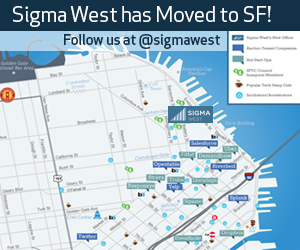 Good morning! Big day today here in SF, with the America Cup’s race scheduled to start at 1:15 pm PST. We’re hoping for a big win by Oracle Team USA. (We suggest steering clear of Larry Ellison until the race ends to be on the safe side.)
Good morning! Big day today here in SF, with the America Cup’s race scheduled to start at 1:15 pm PST. We’re hoping for a big win by Oracle Team USA. (We suggest steering clear of Larry Ellison until the race ends to be on the safe side.)
————-
Top News in the A.M.
Amazon has introduced three new Kindle Fire models. CEO Jeff Bezos explains the company’s thinking behind them.
Chinese Internet company Alibaba is reportedly moving its IPO to the U.S.; the listing could be valued at up to $15 billion.
Don Dodge on Indoor Marketing: VCs Missing a “Huge” Opportunity
Don Dodge — a Google Ventures advisor who helps developers build new applications on Google platforms and technologies – says VCs are still outsiders when it comes to indoor mobile location services. He compares the moment to the earliest days of maps and GPS, which are now integrated into just about every application on the Web, but that few investors knew what to do with initially.
We talked about what’s happening last week.
You’re very focused on indoor marketing. Why?
At a very high level, we spend 90 percent of our time indoors, and indoors is where commerce happens.
What’s among the most interesting things you’re seeing?
There are a bunch of companies that can create [digital] floor plans of stores like Toys”R”Us, Office Depot and Walgreens. Stores then give them SKU [stock keeping unit] maps that tell them where products are located on the shelves for inventory purposes, then [the apps] use indoor location technology to recognize where a customer is standing. It isn’t too far of a leap to imagine that as you’re looking at the Gucci bags at a department store, you receive a coupon from Coach.
What strikes you as promising beyond retail applications?
Think about mobile games that could take of advantage of location, like Risk or Monopoly or Capture the Flag, and how they might incorporate the store or the university dorm room that you’re standing in.
There are social aspects, too. Say you’re at a concert and know that five friends are there amid 50,000 other people. Indoor location technologies can tell you exactly where those five friends are. And there are probably 400 more examples of market applications that no one has thought about yet.
There are numerous technical approaches to all of these things, right?
One is Wi-Fi, where you phone accepts signals and triangulates where you are. WifiSLAM, an indoor GPS company that Apple recently acquired, was one example, but there are about 15 other companies that are doing things with Wi-Fi triangulation.
Another area is Bluetooth beacons. Every smartphone has Bluetooth to connect to other devices. Well, the same Bluetooth channel can be used to bounce off known locations to determine where you are.
Other companies are using sound waves, while others still, like Bytelight, are using LED lights in the ceiling. They pulse at a rate of a hundred times a second, which is faster than the human eye can see, but the front-facing camera of a phone can pick up the pulse and know by which light you’re standing.
Apple reportedly paid $20 million for WiFiSLAM. A number of other companies, including Cisco, Ruckus Wireless, and Aruba Networks, have acquired indoor technologies for undisclosed amounts. Is there going to be a big breakout story here?
It won’t be like social, where there are one or two leaders and everyone else is an also-ran. Instead, there will be hundreds of winners because there are so many different market applications and vertical applications.
And you think VCs are missing all the action. Why?
There have been at least three major acquisitions over the past four months, so now they’re saying, “Hey, there’s something going here.” But by and large, it’s a new, emerging area, with probably 50 small, unknown startups with angel investment or a little VC money that [other] VCs aren’t paying attention to.
When you see more stories about companies being acquired by big companies, then there will be a land grab.
(Readers, for more on indoor marketing, you might want to check out this October 8 summit in San Francisco.)
New Fundings
BioDigital, a year-old, New York-based imaging startup focused on 3D visualization of the human body, has raised $4 million led by FirstMark Capital. Much more on the funding can be found here.
BlueData Software, a Mountain View, Calif.-based startup founded last year by two VMWare executives, has raised $15 million in Series B financing led by Ignition Partners. Previous investors Atlantic Bridge Ventures, Intel Capital, Amplify Partners and Data Collective also participated in the round, which brings the company’s total funding to $19 million. The company’s first product is being privately tested, and no details have been released yet.
Moxtra, a Cupertino, Calif.-based company that launched earlier this year, has closed on $10 million in Series A funding from investors that include Cisco, KDDI of Japan, China’s Innovation Works, and Starwood Capital‘s Barry Sternlicht. Moxtra. Founded by numerous former WebEx employees, Moxtra’s cloud-based collaboration app allows users to interact across multiple devices.
NGDATA, a Gent, Belgium-based company that sells its customer intelligence management software to enterprises to better drive sales, has raised $3.3 million in funding led by Capricorn Venture Partners. Sniper Investments and several unnamed angel investors also participated in the round, which brings the company’s total funding to date to $5.8 million.
PatientSafe Solutions, a San Diego-based company focused on patient-safety-related clinical workflow applications, has raised $27 million in Series C funding led by Merck Global Health Innovation Fund. Previous investors Camden Partners, TPG Biotech, Psilos Group and EDBI, the investment unit of theSingapore Economic Development Board, also participated.
Prosper, the San Francisco-based people-to-people lending marketplace, has raised $25 million, according to a new SEC filing. The Form D list several directors, including Rajeev Date, who once served as Deputy Director of the United States Consumer Financial Protection Bureau. Stephan Vermut, a former Wells Fargo executive who became president of Prosper in July of this year, and Chris Bishko, an investment partner at Omidyar Network, are also included in the filing.
Simplee, a Palo Alto, Calif.-based company that is developing a platform for patient payments, has raised $10 million in Series B funding led by Heritage Group, which was joined by previous investors Greylock Partners Israel and The Social+Capital Partnership. The three-year-old company has raised roughly $18 million to date.
Socure, a year-old, New York-based startup that verifies online identities through “social biometrics,” has raised $600,000 in seed funding via debt and convertible notes, according to an SEC filing.
VIPorbit Software, a Dallas-based contact manager for the Apple desktop and device market, has raised $1 million, led by cofounder Max Pucher and Harry Jacobson, a managing partner at TriStar Technology Partners and included nine of the company’s angel investors. The funding brings total financing to date for the three-year-old company to $3.5 million.
————-
People
Michael Moritz, the billionaire chairman of Sequoia Capital, has told Forbes that he and his wife, Harriet Heyman, plan to give away their entire fortune during their lifetimes. “We don’t intend to expire with any money in our pocket,” he said. Moritz was speaking to Forbes about $30 million that the couple has just donated to the University of California, San Francisco, to fund an endowment for basic science PhD students. According to Forbes, it’s the largest endowed program for PhD students in the history of the University of California.
Adrian Fenty, who rose to national prominence as the mayor Washington D.C. between 2007 and 2011, has joined the Palo Alto, Calif., office of law firm Perkins Coie, where he’ll focus on expanding the firm’s emerging company and venture capital practice. Fenty also continues to serve on the boards of two nonprofits and as a special advisor with Andreessen Horowitz, which brought Fenty into the fold one year ago.
—————-
Exits
5by, a year-old Montreal-based video startup, has been acquired by StumbleUpon of San Francisco. Terms of the deal were not disclosed, but the acquisition is the first for StumbleUpon, a popular discovery service for online content.
——————-
IPOs
Thirteen tech companies are planning to go public this week. Among them:
Applied Optoelectronics, a Houston-area fiber-optic networking products company, is expected to begin trading publicly tomorrow, with its shares being offered at between $13 and $15. Among those investors planning to sell some of their holdings in the offering — expected to raise $50 million for the company — are Grand River Capital Investment Company, Sycamore Management, and Harbinger III Venture Capital Corp.Corporation. More here.
Covisint, a Detroit-based cloud engagement platform that is being spun out of Compuware is also expected to begun trading publicly tomorrow. Its shares are being offered at between $9 and $11, with the company planning to raise $64 million from the offering.
—————
Job Listings
Merger Partners, a Dallas-based firm that scouts for possible acquisitions for private equity groups and operating companies, is looking for an associate in San Francisco. The role entails everything from cold-calling management teams and business owners to helping deals move toward successful closings. To land it, you’ll need at least three years of experience in either business development and/or sales, PE, corporate finance, commercial lending, investment banking, or venture capital.
—————
Essential Reads
If your kids live in California and are under 18, Governor Jerry Brown has given them one last shot at permanently deleting any Facebook, Twitter or Tumblr posts that could otherwise haunt them as college students and beyond.
Could shared “micro apartments” represent the next wave of the sharing economy?
Nest Labs, the well-funded, three-year-old maker of a smart thermostat, is working on another way into users’ homes: it’s making smoke detectors.
Drama in Helsinki, as Nokia begs its former CEO to accept less than the $25 million bonus promised to him (and he says fat chance).
————–
Detour
A therapist shines a light on a little-known problem: brainy, mentally gifted, single-minded boys who are being falsely diagnosed with autism spectrum disorder.
—————-
Retail Therapy
This deep-pocketed Jaktogo jacket enables you to wear all your possessions, including electronic devices. The good news: the jacket could mean fewer baggage fees at the airport. The bad news: the jacket could land you in small, windowless room with TSA officials all day.
GQ says that “animal prints” are legitimately “in” right now. GQ is often a reliable source for information regarding men’s fashion. This time, do not listen to GQ.
———–
Please feel free to send us any and all story suggestions (anonymous or otherwise) by clicking here. If you’re interested in advertising in our email newsletter, please click here. To sign up for the newsletter, visit strictlyvc.com.













